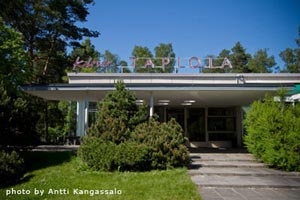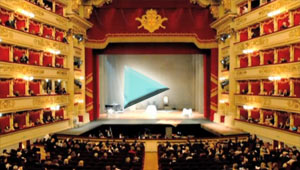
Reg. Trib. Milano n. 418 del 02.07.2007
Direttore responsabile: Elisabetta Brunella
![]()
![]()
International Edition No. 73 - year 6 - 2 July 2011

***
From the eighth
edition of the course
“DigiTraining Plus: European Cinemas Experiencing New Technologies”
Helsinki and Tallinn
29 June - 3 July 2011
- daily update -
 This
is where the Kino Tapiola operates, an example of how tradition and innovation
can live successfully side by side. Built by Aarne Ervi in the functionalist
style of the ‘Fifties and the symbolic building of a new residential
area of the same name – defined a “garden city” –
the Tapiola was completely renovated between 2008 and 2010 thanks to the
Municipality of Espoo and was fitted with a digital projector, 3D system
and satellite connection with the support of the Finish Film Foundation.
As well as quality programming – the next few screenings include
Terrence Malick and Woody Allen – the cinema is the venue for various
cultural initiatives, including the International Festival in August.
“The Municipality’s intervention,” says Georg Dolivo,
head of culture for the City of Espoo, “could be described as the
rebuilding of a collapsed roof. But this would not do it justice: in actual
fact, the re-opening of the Tapiola is just one of the stages in a development
project for the next ten years which sees Espoo committed to bringing
together science, art and the economy, using as levers strong points such
as the Alvar Aalto University and the local presence of companies worth
60% of Finnish economic activity. In this context, we acknowledge the
Tapiola as having a leading social and cultural function which provides
added value in the area and which the population is not prepared to do
without.”
This
is where the Kino Tapiola operates, an example of how tradition and innovation
can live successfully side by side. Built by Aarne Ervi in the functionalist
style of the ‘Fifties and the symbolic building of a new residential
area of the same name – defined a “garden city” –
the Tapiola was completely renovated between 2008 and 2010 thanks to the
Municipality of Espoo and was fitted with a digital projector, 3D system
and satellite connection with the support of the Finish Film Foundation.
As well as quality programming – the next few screenings include
Terrence Malick and Woody Allen – the cinema is the venue for various
cultural initiatives, including the International Festival in August.
“The Municipality’s intervention,” says Georg Dolivo,
head of culture for the City of Espoo, “could be described as the
rebuilding of a collapsed roof. But this would not do it justice: in actual
fact, the re-opening of the Tapiola is just one of the stages in a development
project for the next ten years which sees Espoo committed to bringing
together science, art and the economy, using as levers strong points such
as the Alvar Aalto University and the local presence of companies worth
60% of Finnish economic activity. In this context, we acknowledge the
Tapiola as having a leading social and cultural function which provides
added value in the area and which the population is not prepared to do
without.”
“The new technology our cinema has been equipped with allows us to develop its functional potential and vary the use made of it: a weekly programme which, although only having only one screen available, offers up to six different titles, European film weeks, activities for schools, live concerts, electronic games for young people, conferences promoted by companies and seminars organized by local associations,” explain Jenni Ukkonen and Hannele Pellinen, of whom the former is manager of the International festival and the latter of the cinema.
If the Tapiola team showed that digital “works” for a single-screen cinema, Jan Petersen gave an example of a big chain: Nordisk Film, the leading Danish operator. Pioneer of the new technologies since 2004, Nordisk now has 30 2K digital screens. But the plan for the coming months is extremely ambitious: all 114 screens will be fitted with 4K or 2K digital projectors by 2012, thanks to an agreement freshly signed with XDC, who will act as integrators.
Technology at the service of diversifying content: this is the area on which Tilman Scheel’s talk concentrated, presenting the work of Europe’s Finest, an innovative channel that exhibitors can refer to in order to extend the range of the European films they offer. At the same time this creates audiences curious to discover Europe’s film production. Of both the present and the past. And for the exhibitor, just by clicking online. A little more time may be required for discussing economic conditions …
The afternoon will continue with an overview of collective initiatives promoted in Europe by the exhibitors’ associations.
Programme 2 July
Cinema Tapiola, Espoo.
Welcome, cinema tour and screening of trailers
Saving Kino Tapiola: the city's perspective, by Georg Dolivo, Director of Cultural Affairs/City of Espoo
Project Kino Tapiola: the re-opening of the local cinema (2009-2010), by Jenni Ukkonen, Chairperson of the Board, Kino Tapiola/former Executive Director of Espoo Ciné Int’l Film Festival
Q&A session
Coffee break
Alternative content is more than opera, by Tilman Scheel, Europe’s Finest
Digital Cinema - The need and value of partnerships: how long terms deals change the interaction between cinemas and their suppliers, by Jan Petersen, Nordisk Film
Q&A session
Afternoon - Finnish Film Foundation Auditorium
The business model for the Dutch national
digital project by Ron Sterk, NVB
Harnessing the value of the VPF, by Steve Perrin, DPF
Digital conversion, alternative content and other digital issues - the Italian story, by Nicola Grispello, Metropolitan
Q&A session
coffee break
3D Future perspectives by
Bernard Collard, XpanD
Q&A session
How can a movie theatre be transformed thanks to the new technologies?
John Fithian, President of NATO
Q& A
Final statements: Harri Ahokas
Visit to KesaKino Engel, Helsinki
Presentation of the cinema by Mika Siltala, Cinemamondo
MEDIA Salles’ contacts and address MEDIA Salles |
